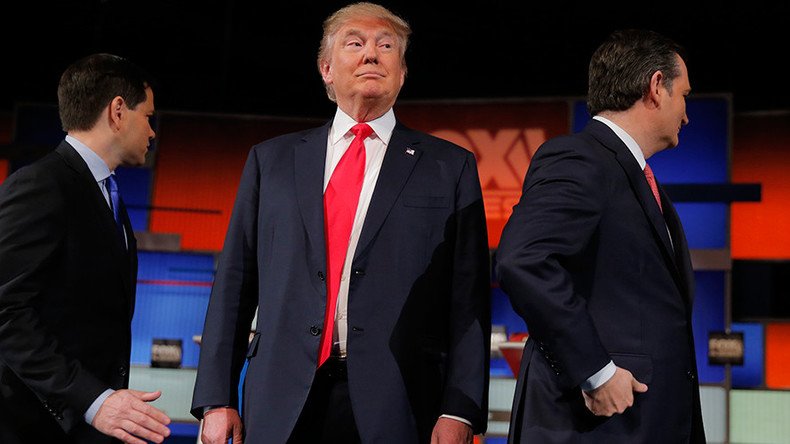Top Republicans refuse to back Trump despite past words and calls for unity

From House Speaker Paul Ryan to former presidential nominees Mitt Romney and John McCain and the former Republican presidents themselves, both George Bushes, it seems the recent GOP call to unite the party around Donald Trump is falling on many deaf ears.
“Majority America” was who Senator Ben Sasse (R-Nebraska) hoped to reach in an open letter posted on Facebook Wednesday night, referring to those voters who oppose both Trump and the anticipated Democratic presidential nominee, Hillary Clinton.
“With Clinton and Trump, the fix is in. Heads, they win; tails, you lose,” Sasse wrote. “Why are we confined to these two terrible options? This is America. If both choices stink, we reject them and go bigger. That’s what we do. Remember: our Founders didn’t want entrenched political parties. So why should we accept this terrible choice?”
The post received over 14,000 Likes, 10,653 shares, and over 3,300 comments by Thursday evening. Though offering up no specific third choice, it did imagine a “consensus candidate” who would campaign on a “national security strategy for the age of cyber and jihad,” as well as “honest budgeting/entitlement reform,” and “empowering states and local governments” to reform education and target “career politicians” with electoral reforms.
Trump happens to have touched on all of those issues in his campaign as well, so it appears that the anti-Trump movement is mostly about how the issues are voiced.
“I hope to support our nominee,” House Speaker Paul Ryan (R-Wisconsin) told CNN’s Jake Tapper on Thursday. “I hope to support [Trump’s] candidacy fully, and I want to do that, but right now, I gotta tell ya Jake, just being candid with ya, at this point, I'm just not there right now.”
Trump did not take long to answer in kind.
Trump response to Paul Ryan pic.twitter.com/HVWRhQXRA1
— Allan Smith (@akarl_smith) May 5, 2016
“I am not ready to support Speaker Ryan's agenda. Perhaps in the future we can work together and come to an agreement about what is best for the American people. They have been treated so badly for so long that it is about time for politicians to put them first!” he said in a statement.
Ryan was the GOP’s vice-presidential candidate in 2012 and currently sits third in the line of succession to the presidency, but he is far from the most notable political figure refusing to back Trump. While some Republicans are holding out for Trump to temper his tone, others are more adamant in their “#NeverTrump” convictions.
#TheBigPicture: WOW! Republicans Have Rejected the Republican Party! [VIDEO] @Thom_Hartmannhttps://t.co/C6Hhx9oE3A
— RT America (@RT_America) May 5, 2016
The two living former Republican presidents, George H.W. Bush and his son George W. Bush, have refused to endorse Trump, while the two most recent Republican presidential nominees, Mitt Romney and Arizona Senator John McCain will not even show up to the party's national convention in Cleveland in July.
Trump not only endorsed both Romney and McCain in their White House bids, he also donated the maximum amount allowed to their campaigns.
“Donald Trump has shown an extraordinary ability to understand how our economy works to create jobs for the American people,” Romney said in February 2012 at Trump International Hotel & Tower, after receiving the businessman’s endorsement.
He was saying the opposite in March this year, calling Trump a failed businessman and a “fraud.”
McCain is also taking back his words, even though they were very recent and specifically in reference to a Trump general election ticket.
“If that's the verdict of the Republican Party and the majority of Americans, then I will do everything I can to help that president, whether it be Trump or whoever, because we are in a state of crisis the likes of which we have not seen,” McCain told CBS News in January.
“I certainly would support the nominee, no matter who it is,” McCain told The Hill last September, just two months after Trump questioned his credentials as a Vietnam War hero “because he was captured.”
McCain may not have thought Trump would ever actually win the nomination. Furthermore, the Arizona Senator faces a tough re-election bid in November, likely facing Congresswoman Ann Kirkpatrick as the Democratic challenger.
Ex-Mexican President Vicente Fox apologies to Trump for using F-word on ‘wall proposal’https://t.co/vQVSlFZlUdpic.twitter.com/KCRSEZXVt0
— RT America (@RT_America) May 5, 2016
“If Donald Trump is at the top of the ticket, here in Arizona, with over 30 percent of the vote being the Hispanic vote, no doubt that this may be the race of my life,” McCain said during a private fundraising meeting, according to the audio recording obtained by Politico. “If you listen or watch Hispanic media in the state and in the country, you will see that it is all anti-Trump. The Hispanic community is roused and angry in a way that I've never seen in 30 years.”
Trump has showed indifference toward McCain and Romney’s refusal to attend the upcoming Republican National Convention. He has not yet commented on the possible absence of the father and son Bush.
“I think senior actually did a pretty good job of what he was doing,” Trump said of the elder Bush in February on NBC’s Meet the Press, comparing his 1991 Gulf War to the younger Bush's Iraq War, which Trump has repeatedly called a “disaster.”
Trump sets off Cinco de Mayo controversy with ‘taco bowl’ tweethttps://t.co/xG6PXQc7anpic.twitter.com/nln8JVnuIA
— RT America (@RT_America) May 5, 2016












